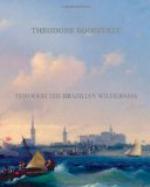In Anthony Fiala, a former arctic explorer, we found an excellent man for assembling equipment and taking charge of its handling and shipment. In addition to his four years in the arctic regions, Fiala had served in the New York Squadron in Porto Rico during the Spanish War, and through his service in the squadron had been brought into contact with his little Tennessee wife. She came down with her four children to say good-by to him when the steamer left. My secretary, Mr. Frank Harper, went with us. Jacob Sigg, who had served three years in the United States Army, and was both a hospital nurse and a cook, as well as having a natural taste for adventure, went as the personal attendant of Father Zahm. In southern Brazil my son Kermit joined me. He had been bridge building, and a couple of months previously, while on top of a long steel span, something went wrong with the derrick, he and the steel span coming down together on the rocky bed beneath. He escaped with two broken ribs, two teeth knocked out, and a knee partially dislocated, but was practically all right again when he started with us.
In its composition ours was a typical American expedition. Kermit and I were of the old Revolutionary stock, and in our veins ran about every strain of blood that there was on this side of the water during colonial times. Cherrie’s father was born in Ireland, and his mother in Scotland; they came here when very young, and his father served throughout the Civil War in an Iowa cavalry regiment. His wife was of old Revolutionary stock. Father Zahm’s father was an Alsacian immigrant, and his mother was partly of Irish and partly of old American stock, a descendant of a niece of General Braddock. Miller’s father came from Germany, and his mother from France. Fiala’s father and mother were both from Bohemia, being Czechs, and his father had served four years in the Civil War in the Union Army—his Tennessee wife was of old Revolutionary stock. Harper was born in England, and Sigg in Switzerland. We were as varied in religious creed as in ethnic origin. Father Zahm and Miller were Catholics, Kermit and Harper Episcopalians, Cherrie a Presbyterian, Fiala a Baptist, Sigg a Lutheran, while I belonged to the Dutch Reformed Church.
For arms the naturalists took 16-bore shotguns, one of Cherrie’s having a rifle barrel underneath. The firearms for the rest of the party were supplied by Kermit and myself, including my Springfield rifle, Kermit’s two Winchesters, a 405 and 30-40, the Fox 12-gauge shotgun, and another 16-gauge gun, and a couple of revolvers, a Colt and a Smith & Wesson. We took from New York a couple of canvas canoes, tents, mosquito-bars, plenty of cheesecloth, including nets for the hats, and both light cots and hammocks. We took ropes and pulleys which proved invaluable on our canoe trip. Each equipped himself with the clothing he fancied. Mine consisted of khaki, such as I wore in Africa, with a couple of United




